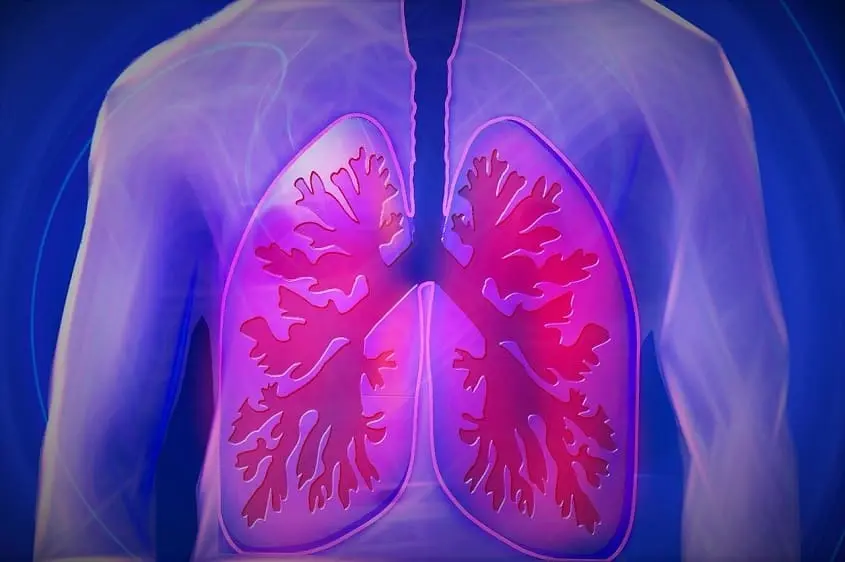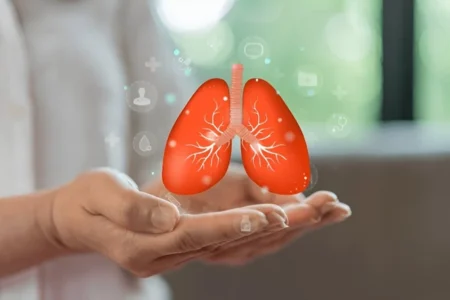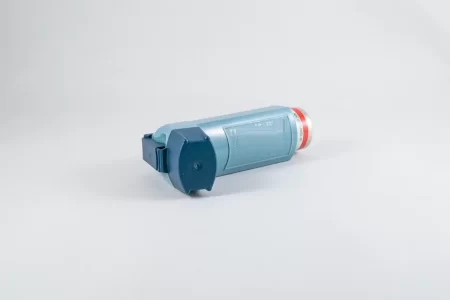Chronic Obstructive Pulmonary Disease (COPD) Cough
- Updated on: Jul 10, 2024
- 3 min Read
- Published on Feb 5, 2020

Chronic obstructive pulmonary disease (COPD) is a long-term lung disease caused due to exposure of lungs to various irritants and particulate matters especially cigarette smoke. Patients suffering from this lung condition find it very difficult to breathe normally.
COPD patients present different signs and symptoms like breathing problems, mucus production, wheezing, and persistent cough. COPD makes people susceptible to various life-threatening conditions like heart diseases, lung cancer, and various other conditions.
What Is COPD Cough? What Causes COPD Coughing
Chronic obstructive pulmonary disease (COPD) cough is one of the important and frequently reported symptoms of COPD exacerbations. A persistent cough in COPD followed by sputum production may be an indication of disease progression. People with COPD often suffer from persistent coughing which becomes very annoying especially during social events. Therefore, such patients consult doctors or visit urgent care centers for seeking relief from their chronic COPD associated cough.
COPD cough is caused due to inflammation of the airways. Also, some mediators of inflammation may have a role in cough reflex activation and mucus secretion but this is not proved yet. Several studies have suggested that smoking may be also involved in the cough reflex sensitivity in COPD but it is not confirmed yet.
Inflammation of airways associated with COPD is caused due to an exposure to various irritants like smoking, pollution, particulate matter, etc. Airway inflammation in COPD may lead to excess mucus production from the lungs, and also inflammation in the lining of the air ways. A persistent cough is very common in COPD patients with chronic bronchitis.
More: End-Stage Chronic obstructive pulmonary disease (COPD)
Relationship Between COPD and Coughing
Although persistent coughing can be very annoying for COPD patients, it can be productive as well because it helps in clearing airways that are blocked by excess mucus accumulation, and therefore makes your breathing easier.
Some doctors suggest their patients to cough as much as they can because it will clear their airways and promote easy breathing. However, it should be noted that all coughs are not productive. Only effective or controlled coughing is useful in getting rid of the trapped mucus. Explosive or uncontrolled coughing can be dangerous as it may collapse the airways which in turn can result in mucus being trapped within the airways.
Effective or Controlled Coughing in COPD
Effective or controlled cough is a productive cough that may help patients in getting rid of the excess mucus trapped within the airways. It is a protective mechanism for sputum clearance in COPD.
Controlled coughing in COPD patients saves energy and also clears the mucus without collapsing or narrowing the airways. COPD results in excess mucus production within the lungs which ultimately results in coughing. This mucus gets cleared with controlled coughing as it comes from deep within the lungs and has just enough force to loosen this mucus. Doctors often recommend patients to go for controlled coughing.
Techniques for Effective or Controlled Coughing in COPD Patients
COPD patients can benefit from effective or controlled coughing by following the below-mentioned techniques:
- Sit on the chair or the edge of your bed, rest your feet on the floor, lean forward and then relax your body
- Fold your arms across your abdomen and then breathe gently through your nose
- For exhaling, you should lean forward and then press your arms across your abdomen. Try to cough two to three times through a slightly open mouth. The first cough helps in loosening the mucus and moving it through the airways while the second and third cough enables you to cough the mucus up and out. You should remember that coughs should be short and sharp.
- After this, you should breathe again by sniffing slowly and gently through your nose. This is very helpful in preventing the backflow of mucus towards the airways.
- Take rest and relax your body. You can again perform the same procedure if needed.
Is it Possible to have COPD Without Cough?
COPD is a group of progressive lung diseases and two diseases that are mainly included in the COPD are emphysema and chronic bronchitis. COPD results in excessive mucus production and coughing in the case of chronic bronchitis due to irritation and inflammation of the air ways.
COPD can occur without coughing also as in case of emphysema. Emphysema is classified as COPD and it is characterized by shortness of breath due to collapsing of the alveoli or air sacs in the lungs. Many people suffering from emphysema have no cough or mucus production.
How can we Treat COPD Cough?
Persistent coughing in COPD can be decreased with the help of long-acting inhaled beta-agonists such as salmeterol. Bronchodilators like beta-agonists help in opening the air ways and therefore getting more oxygen into the lungs.
Some cough syrups may also help in getting the relief. Productive cough helps in clearing out the mucus and should be prevented from treating especially if it is not bothering you. Cough with thick mucus can be prevented with the help of expectorants.
Drinking plenty of fluids can help in thinning the mucus and therefore may also provide some relief. COPD coughing can sometimes result in bronchospasm due to the narrowing of the airways. As a result, patients are unable to breathe properly. In such cases, bronchodilators or inhaled steroids can help in preventing the spasms.












